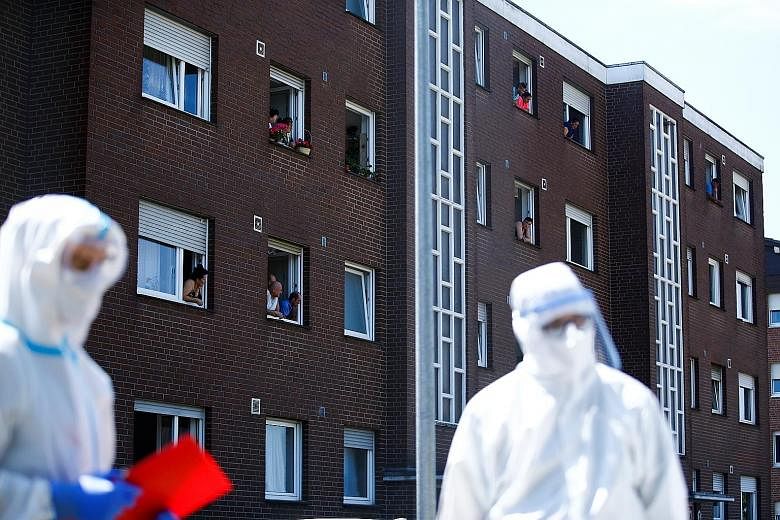BERLIN • The German authorities yesterday ordered new lockdowns in two districts - the first such since the easing of restrictions and a major setback for hopes of a swift return to normality.
The new lockdowns in Guetersloh and neighbouring Warendorf in western Germany came after a coronavirus outbreak at a slaughterhouse that has infected more than 1,500 workers.
"For the first time in Germany, we will return an entire district to the measures that applied several weeks ago," said Mr Armin Laschet, state premier of North Rhine-Westphalia, when announcing the measures for Guetersloh.
That fresh lockdown, set to affect 360,000 people, will stay in place until at least June 30, Mr Laschet said.
The state's health minister Karl-Josef Laumann later ordered similar measures for Warendorf, covering a further 278,000 residents.
The outbreak at a slaughterhouse run by the Toennies meat company that employs 7,000 people in Germany's most populous state is the biggest since the country began lifting virus lockdown measures in early May.
The local authorities had agreed then to pull an "emergency brake" and reimpose social curbs if the infection rate rises above 50 cases per 100,000 residents over a week in a particular district.
The rate in Guetersloh has soared well above that, sitting at 263 cases per 100,000 residents on Monday.
The new lockdown means a return to measures first introduced in March, with cinemas, museums, concert halls, bars, gyms, indoor swimming pools and saunas shut down, Mr Laschet said.
Schools and kindergartens have also been closed ahead of school holidays from this weekend.
Guetersloh resident Brigitte Jaeger said: "It is probably a little too late, otherwise it would not have spread so much."
Several outbreaks at slaughterhouses, not just in Germany but also in France, have put a spotlight on the working and housing conditions of workers - many of whom come from Romania or Bulgaria.
The German government has banned the use of subcontractors in the meat industry in a bid to curb the controversial practice of companies using middlemen to supply workers from abroad who are more vulnerable to abuses.
But Germany has also seen new clusters in residential buildings in Lower Saxony and in Berlin, where 370 families living in high-rise flats were placed under quarantine in one neighbourhood last week.
The country's infection rate remains well above the government's target, highlighting the risk of outbreaks.
The reproduction rate edged lower to 2.76 on Monday following three straight increases, according to the latest estimate from the Robert Koch Institute (RKI).
This means that out of 100 people who contract the virus, a further 276 people will get infected.
The government is trying to keep the figure below 1.0 to prevent a second wave of infections.
"We must continue to be vigilant," RKI head Lothar Wieler told reporters yesterday.
"If we give it the chance to spread, it will take that chance - we can see that in the current development of outbreaks."
Despite the new outbreaks, Dr Wieler is optimistic that the virus will remain under control in Germany.
"If we are able to keep the number of cases low the whole time, then we will be able to contain and end outbreaks locally."
AGENCE FRANCE-PRESSE, BLOOMBERG

